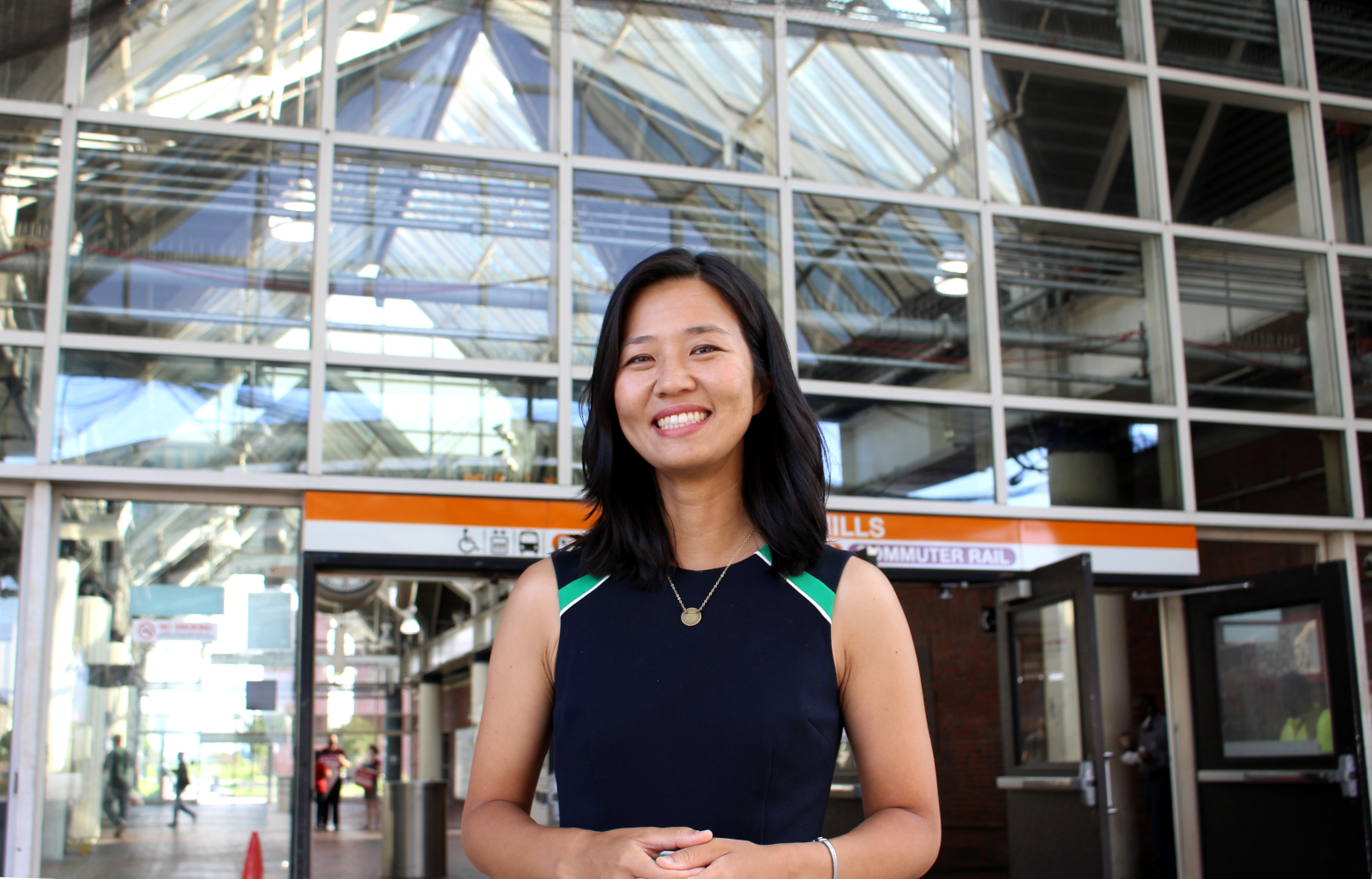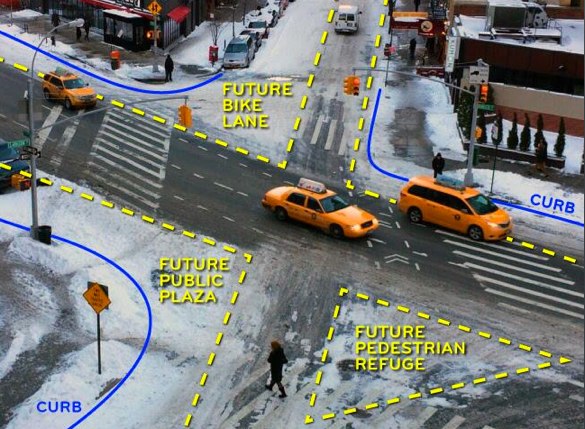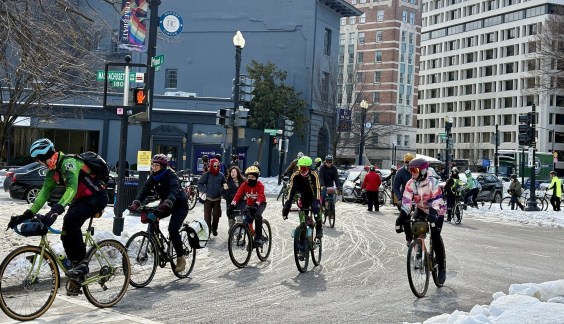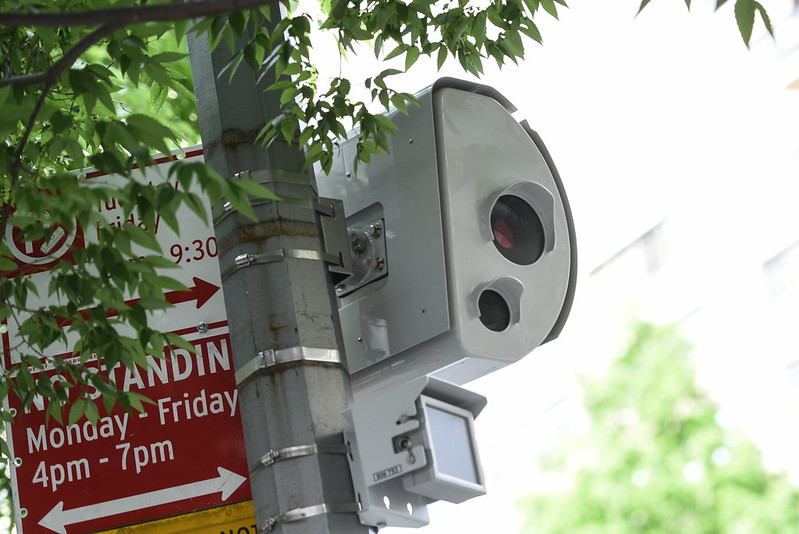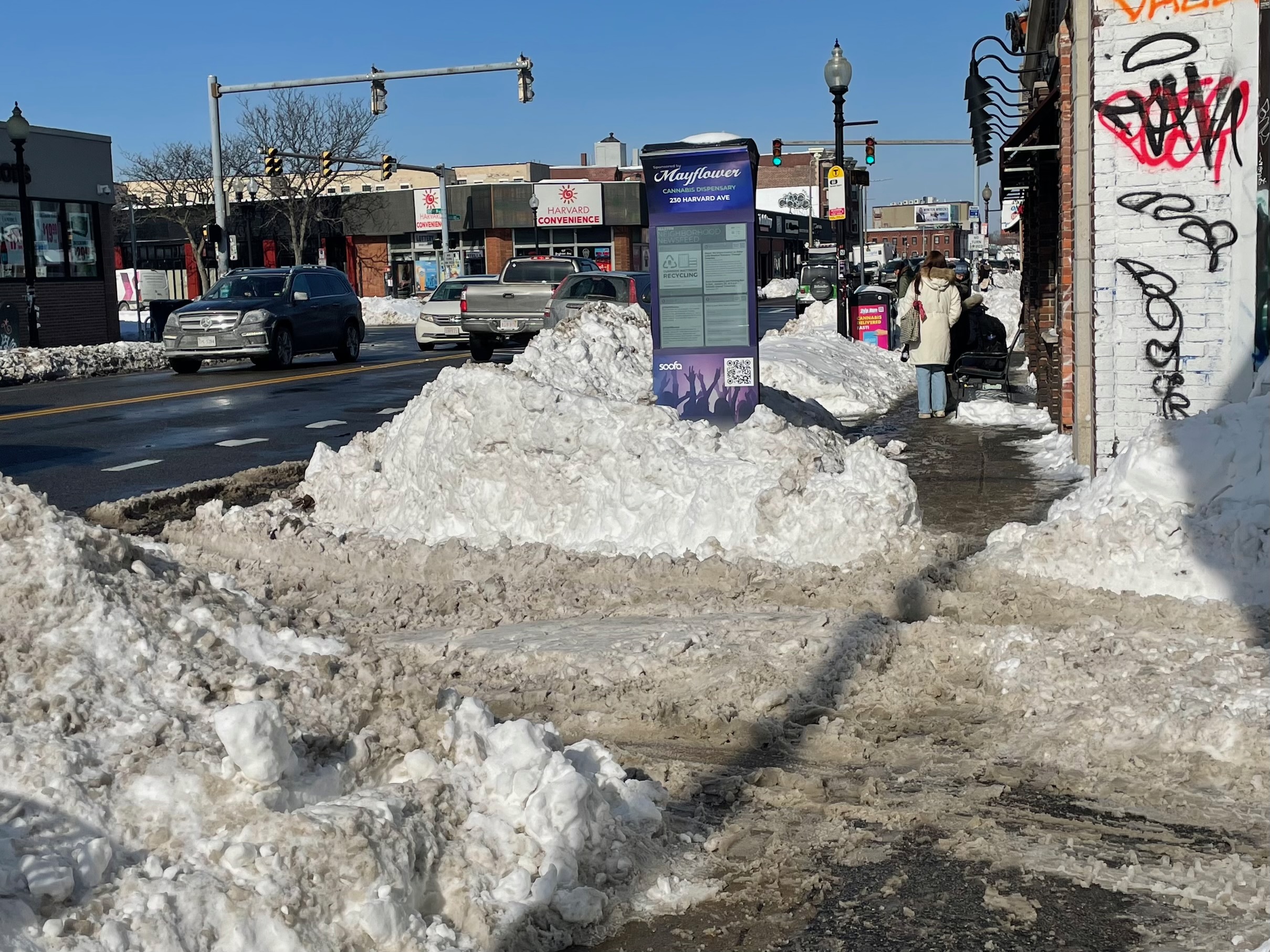This summer, StreetsblogMASS has invited each of the major contenders in Boston’s mayoral race to join us for a walk, bike ride, or transit trip that’s personally meaningful to them and have a conversation about their ideas for what Boston’s next mayor should do to address the challenges of safe mobility, climate change, and affordable housing.
A preliminary election on Tuesday, Sept. 14 will eliminate all but two candidates from the race. Voters will then choose between the two finalists in the general election on Tuesday, Nov. 2. Boston residents can find out more about how and where to vote here.
City Councilor Michelle Wu met me last week for a conversation at the Forest Hills Orange Line station, where she frequently transfers between the bus and the subway system on her way to and from her home in Roslindale. The following is a transcript of our conversation, edited for length and clarity.
Could you introduce yourself to Streetsblog readers, and tell us why you're running for mayor?
I'm a mom of two kids in our Boston Public Schools; I am the daughter of immigrants, and I live in a multi-generational household where I'm the caregiver for my mom, who has been living with mental health challenges. And I'm a regular MBTA commuter.
I'm running for mayor to tackle big challenges in our city, because the decisions that we make in the next three to five years will determine what opportunities are there for the next three to five generations. And we need to make sure every voice is part of shaping our future.
Why did you choose to meet at Forest Hills today? How is this place personally meaningful to you, and how does it inform your approach to transportation policy in Boston?
I rode the bus here from Roslindale Square. And that little-over-a-mile trip from the Square to Forest Hills, at one point, it took almost half an hour: from waiting for the bus to come, to getting stuck in traffic… After we fought for a dedicated bus lane, it’s been so much faster, it's been transformational.
This is my regular commute. I've been through this station hundreds of times, whether running through the gates by myself to catch the next Orange Line train, or with a big double stroller with two kids in it, or meeting family and constituents.
When I ride the T, it's not only about getting to where I need to go, but (also) the fact that public transportation also creates a community space for people from all walks of life, and all backgrounds, to be together for a little bit and have a little connection while we are on our on our ways to where we're going.
So speaking of the T, what can the mayor's office do to improve it when the MBTA is a state-run agency, and has a lot of regional competing interests from other cities and towns in the area?
There's so much that's directly within city control. For example, the allocation of street space, and how we run our streetlights. There's the potential to create dedicated bus and bike lanes all across the city in our most congested corridors, and to ensure transit signal priority for transit vehicles.
In the eight years that I've been on the council, making sure that transportation was explicitly part of the policy agenda, we've seen huge changes in how city government can impact decision making and policy.
This weekend, we'll see the start of the city's first fare-free bus route pilot, after advocating for public transportation to be a public good for many years now, and specifically calling for the 28 bus to be the starting point, as an important route that runs through communities of color and connects one of the most critical economic corridors in our city.
We need the platform of city government and the mayor's office to step up in shaping the large-scale infrastructure projects and decisions that affect Bostonians' lives as well. I've been calling for the acceleration of the West Station and I-90 interchange project to be built with a focus on mobility and sustainability, along with advocates.
We need to connect the Red and Blue lines while MGH (Mass. General Hospital) is pursuing redevelopment right in that area. And we could electrify and dramatically speed up service on the Fairmount line, again, opening up opportunities for so many in our city.
So whether it is partnering on issues within city control, or advocating forcefully for what our constituents need at the state level, city leadership matters so much in transportation policy.
Some of those big projects – like the red-blue connector, electrifying the Fairmount line – they're on the T’s agenda, but there’s a lot of other stuff that they need to do with limited funding. Would you be willing to commit city resources to accelerate those projects?
This should be a partnership. And there are many examples of that kind of collaboration, moving projects along. And we saw that with the dedicated bus lane designs that have gone up in various places around the city. We've seen how other cities like Lawrence, and now in Boston, have launched pilots for fare equity. And we've seen them in some of the new infrastructure projects along the Green Line as well.
How would you rate the Walsh administration on transportation issues? And if you were elected, how might you change things?
The city has grown so much. Over the last eight years - we've seen the new Census data. We saw significant population increase, but within those numbers, even while Boston as a city is growing and growing more diverse, the population of black Bostonians is lower now than it was 10 years ago.
And so within that, we really see the story of Boston growing for those who can afford to be here, and get around to where they need to go, and the forces of displacement exacerbated for everyone else.
And so transportation is a key part of housing policy, of climate policy, of economic development, and closing the racial wealth gap. We can not just grow as a city without investing in the infrastructure to accommodate that growth.
I'm on buses and on the subway, and occasionally (but not too often, because it's too expensive) the commuter rail, so I've seen how our transportation system has fared over the last eight years. And while Boston has started to take a larger role, when pushed, we need proactive leadership coming from the mayor's office to assert the city's interests in all of these decisions.
And the other point is, transportation is not in a silo relative to other policy areas. And the MBTA is not in a silo relative to other modes of transportation. We need to think about really holistically integrating a plan for our bike infrastructure, pedestrian access, all connected with public transit.
There's a lot of concern that as the city invests in projects, like the Fairmount Line and other projects of that nature, that those improvements will make mostly-affordable neighborhoods more desirable, and potentially more expensive. How do you address those concerns?
That is exactly why it is just as important to push for service improvements (as it is) to simultaneously provide for community stabilization. And that's true in housing policy and transportation policy, right? We need to increase the supply of housing, to stabilize residents who are facing displacement, and similarly, on transportation, to do all we can to speed up service and expand access… and also remove financial barriers to accessing (transit services).
So that's why the fare equity and fare-free policies are just as important as a stabilizing force on the transit side.
And speaking of housing, there's pretty broad agreement that the city has a housing shortage, and huge demand for housing near transit. Would you be in favor of reforming the city's zoning laws to make more housing near transit possible to build?
Absolutely.
Can you tell me a little bit more about your specific ideas?
Our housing plan pushes for Boston to use every possible resource at the city level. We have to take responsibility for housing stability at the local level, and not just wait for the state and federal rescue.
This is the most urgent issue facing residents all across our city. It’s what I hear knocking on doors and out in community events. And I am the only candidate who said that out of our federal relief funding that we're receiving for the pandemic, $200 million, at least, (should be allocated) for housing stability. It should be the foundation of our recovery.
When it comes to the tools that we have, resources like city dollars through our capital budget or federal resources (can be used) to directly build more affordable housing, or to leverage city property, integrate the redevelopment of municipal buildings like libraries and community centers or municipal parking lots into housing units as well.
We want to boost homeownership and increase downpayment assistance, to pilot municipal homeownership vouchers – sort of similar to a rental voucher but to close the racial wealth gap with homeownership – and to use one of the most powerful tools of city government, which is our zoning code and the ability to shape developments.
We have spoken about this before. We have one of the most complex opaque and political development approvals processes anywhere in the country. That means a tremendous amount of resources are going into navigating that process and driving up costs, as opposed to simplifying and having a clear set of consistent rules.
So while we are undergoing planning for the entire city, our zoning code hasn't been updated comprehensively citywide since 1965. The first, the most immediate step is to expedite processes for affordable housing proposals. And especially we need increased density near transit. We should think of these as affordable green overlays, where there's a focus on climate resiliency, and affordability and mobility.
You've talked before about wanting to abolish the BPDA. Do you still feel that way?
We need to meet the moment and tackle our biggest challenges. Right now, the structure of our development agency, the way we think about and permit growth across our city is exacerbating all of our disparities. We need a separate planning department that is accountable and not subsumed by the development arm.
Transportation, along with buildings, are the two biggest sources of climate pollution in the city. The Walsh administration adopted a climate plan that said that Boston should cut car traffic in half by 2030, but never made much progress on that goal. It's really going to be up to the next mayor.
Do you still think that's a valid goal? And how do you think we're going get there?
I read the climate report that came out a few weeks ago, the IPCC report. And it laid out five scenarios, to estimate what the impacts would be. And basically, to illustrate how urgent this closing window is, even in the most – even in the best case scenario, where we take every possible step right now, change how we run our economy and society, and use every technology that's available, under that scenario, it would still be 20 years before temperatures stabilize and we start to see the world that we're hoping for.
My kids are four and six. When I think about every morning when I wake up, the first thing on my mind is what do they need right now? And what city are we leaving for them?
If we want our kids to have a fighting chance to thrive in this city, we have no choice but to take every possible step right now. So that means not just setting goals, and having announcements, but digging in and delivering on progress.
I know City Hall inside out, I’ve worked in the building for a decade now, eight years on the Council and working for Mayor Menino before that.
I have a track record of working in coalitions with our amazing advocacy partners and community leaders to have gotten supposedly impossible things done time and again.
And so I know that Boston can take the lead on this, and truly believe that this is not only possible, but necessary.
So our Green New Deal plan is the first city-level Green New Deal anywhere in the country. It came about from a year and a half of working with local activists, and coalition members and national leaders on how municipalities can uniquely move the needle on climate justice.
So of course, transportation is in there. But it's integrated with every other type of policy that we can push at once to get this done for our kids, for their kids, and for the future of the city.
Sometimes it can feel daunting to talk about challenges that are so big, like climate change, and forces that really require international action. But the most impactful steps may be the most immediate ones that are right here at the city level.
We have 700 buses, school buses, in Boston’s fleet. They are all fossil fuel-powered. About 300 of them are diesel buses, which spew 5 to 10 times more particulate pollution. And we know that changing to an electric bus fleet will save us money in the long run over the life of these vehicles, it would clean our air, and will affect the health of all of our community members.
But it's also a solution for withstanding the intense weather that we're experiencing now. Just this past weekend, we nearly got hit with a hurricane; the prediction was that there would be 300,000 power outages across Massachusetts. Well, electric buses are the ideal mobile power stations to be deployed in cases of outages because of vehicle-to-grid technology.
The various steps we need to take to support the health and well-being of our neighborhoods are the steps we need to take to solve our climate crisis. They’re the steps we need to take to bring about the brightest future for young people. So in fact, the impacts are all interconnected and self-reinforcing, and so are the solutions when we decide to confront these crises.
